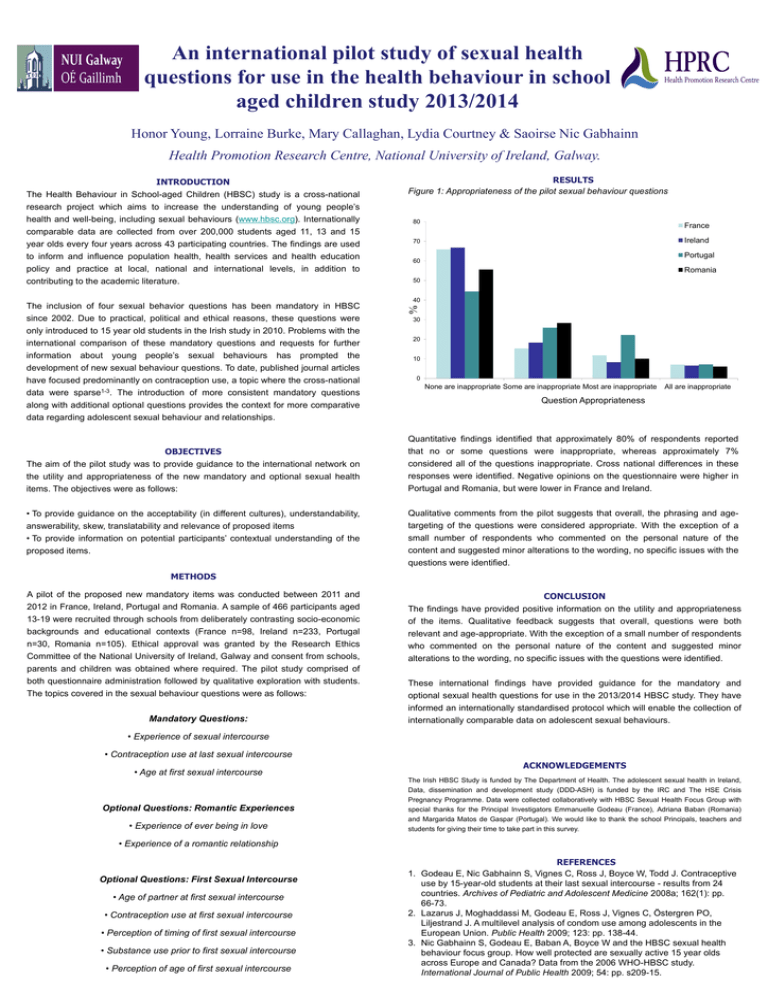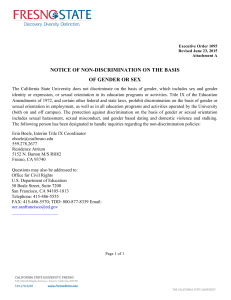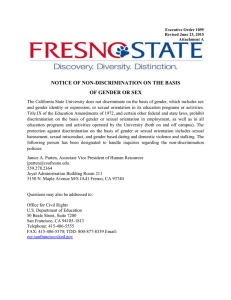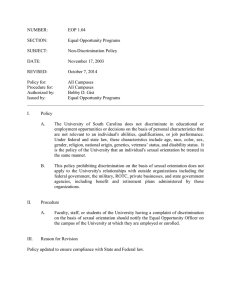An international pilot study of sexual health aged children study 2013/2014
advertisement

An international pilot study of sexual health questions for use in the health behaviour in school aged children study 2013/2014 Honor Young, Lorraine Burke, Mary Callaghan, Lydia Courtney & Saoirse Nic Gabhainn Health Promotion Research Centre, National University of Ireland, Galway. INTRODUCTION The Health Behaviour in School-aged Children (HBSC) study is a cross-national RESULTS Figure 1: Appropriateness of the pilot sexual behaviour questions research project which aims to increase the understanding of young people’s health and well-being, including sexual behaviours (www.hbsc.org). Internationally 80 France comparable data are collected from over 200,000 students aged 11, 13 and 15 year olds every four years across 43 participating countries. The findings are used to inform and influence population health, health services and health education Ireland 70 Portugal 60 policy and practice at local, national and international levels, in addition to contributing to the academic literature. Romania 50 The inclusion of four sexual behavior questions has been mandatory in HBSC % 40 since 2002. Due to practical, political and ethical reasons, these questions were 30 only introduced to 15 year old students in the Irish study in 2010. Problems with the international comparison of these mandatory questions and requests for further information about young people’s sexual behaviours has prompted the 20 10 development of new sexual behaviour questions. To date, published journal articles have focused predominantly on contraception use, a topic where the cross-national data were sparse1-3. The introduction of more consistent mandatory questions 0 None are inappropriate Some are inappropriate Most are inappropriate All are inappropriate Question Appropriateness along with additional optional questions provides the context for more comparative data regarding adolescent sexual behaviour and relationships. Quantitative findings identified that approximately 80% of respondents reported OBJECTIVES that no or some questions were inappropriate, whereas approximately 7% The aim of the pilot study was to provide guidance to the international network on considered all of the questions inappropriate. Cross national differences in these the utility and appropriateness of the new mandatory and optional sexual health responses were identified. Negative opinions on the questionnaire were higher in items. The objectives were as follows: Portugal and Romania, but were lower in France and Ireland. • To provide guidance on the acceptability (in different cultures), understandability, Qualitative comments from the pilot suggests that overall, the phrasing and age- answerability, skew, translatability and relevance of proposed items targeting of the questions were considered appropriate. With the exception of a • To provide information on potential participants’ contextual understanding of the small number of respondents who commented on the personal nature of the proposed items. content and suggested minor alterations to the wording, no specific issues with the questions were identified. METHODS A pilot of the proposed new mandatory items was conducted between 2011 and CONCLUSION 2012 in France, Ireland, Portugal and Romania. A sample of 466 participants aged The findings have provided positive information on the utility and appropriateness 13-19 were recruited through schools from deliberately contrasting socio-economic of the items. Qualitative feedback suggests that overall, questions were both backgrounds and educational contexts (France n=98, Ireland n=233, Portugal relevant and age-appropriate. With the exception of a small number of respondents n=30, Romania n=105). Ethical approval was granted by the Research Ethics who commented on the personal nature of the content and suggested minor Committee of the National University of Ireland, Galway and consent from schools, alterations to the wording, no specific issues with the questions were identified. parents and children was obtained where required. The pilot study comprised of both questionnaire administration followed by qualitative exploration with students. These international findings have provided guidance for the mandatory and The topics covered in the sexual behaviour questions were as follows: optional sexual health questions for use in the 2013/2014 HBSC study. They have informed an internationally standardised protocol which will enable the collection of Mandatory Questions: internationally comparable data on adolescent sexual behaviours. • Experience of sexual intercourse • Contraception use at last sexual intercourse • Age at first sexual intercourse ACKNOWLEDGEMENTS The Irish HBSC Study is funded by The Department of Health. The adolescent sexual health in Ireland, Data, dissemination and development study (DDD-ASH) is funded by the IRC and The HSE Crisis Pregnancy Programme. Data were collected collaboratively with HBSC Sexual Health Focus Group with Optional Questions: Romantic Experiences • Experience of ever being in love special thanks for the Principal Investigators Emmanuelle Godeau (France), Adriana Baban (Romania) and Margarida Matos de Gaspar (Portugal). We would like to thank the school Principals, teachers and students for giving their time to take part in this survey. • Experience of a romantic relationship Optional Questions: First Sexual Intercourse • Age of partner at first sexual intercourse • Contraception use at first sexual intercourse • Perception of timing of first sexual intercourse • Substance use prior to first sexual intercourse • Perception of age of first sexual intercourse REFERENCES 1. Godeau E, Nic Gabhainn S, Vignes C, Ross J, Boyce W, Todd J. Contraceptive use by 15-year-old students at their last sexual intercourse - results from 24 countries. Archives of Pediatric and Adolescent Medicine 2008a; 162(1): pp. 66-73. 2. Lazarus J, Moghaddassi M, Godeau E, Ross J, Vignes C, Östergren PO, Liljestrand J. A multilevel analysis of condom use among adolescents in the European Union. Public Health 2009; 123: pp. 138-44. 3. Nic Gabhainn S, Godeau E, Baban A, Boyce W and the HBSC sexual health behaviour focus group. How well protected are sexually active 15 year olds across Europe and Canada? Data from the 2006 WHO-HBSC study. International Journal of Public Health 2009; 54: pp. s209-15.




